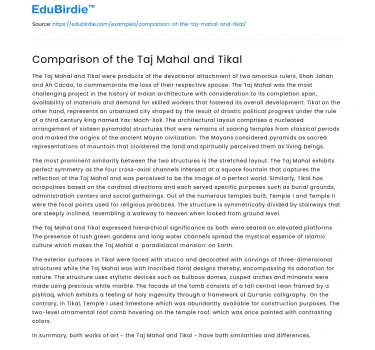The Taj Mahal and Tikal were products of the devotional attachment of two amorous rulers, Shah Jahan and Ah Cacao, to commemorate the loss of their respective spouse. The Taj Mahal was the most challenging project in the history of Indian architecture with consideration to its completion span, availability of materials and demand for skilled workers that fostered its overall development. Tikal on the other hand, represents an urbanized city shaped by the result of drastic political progress under the rule of a third century king named Yax-Moch-Xok. The architectural layout comprises a nucleated arrangement of sixteen pyramidal structures that were remains of soaring temples from classical periods and marked the origins of the ancient Mayan civilization. The Mayans considered pyramids as sacred representations of mountain that cloistered the land and spiritually perceived them as living beings.
The most prominent similarity between the two structures is the stretched layout. The Taj Mahal exhibits perfect symmetry as the four cross-axial channels intersect at a square fountain that captures the reflection of the Taj Mahal and was perceived to be the image of a perfect world. Similarly, Tikal has acropolises based on the cardinal directions and each served specific purposes such as burial grounds, administration centers and social gatherings. Out of the numerous temples built, Temple I and Temple II were the focal points used for religious practices. The structure is symmetrically divided by stairways that are steeply inclined, resembling a walkway to heaven when looked from ground level.
Save your time!
We can take care of your essay
- Proper editing and formatting
- Free revision, title page, and bibliography
- Flexible prices and money-back guarantee
The Taj Mahal and Tikal expressed hierarchical significance as both were seated on elevated platforms. The presence of lush green gardens and long water channels spread the mystical essence of Islamic culture which makes the Taj Mahal a ‘paradisiacal mansion’ on Earth.
The exterior surfaces in Tikal were faced with stucco and decorated with carvings of three-dimensional structures while the Taj Mahal was with inscribed floral designs thereby, encompassing its adoration for nature. The structure uses stylistic devices such as bulbous domes, cusped arches and minarets were made using precious white marble. The facade of the tomb consists of a tall central iwan framed by a pishtaq, which exhibits a feeling of holy ingenuity through a framework of Qur’anic calligraphy. On the contrary, in Tikal, Temple I used limestone which was abundantly available for construction purposes. The two-level ornamental roof comb hovering on the temple roof, which was once painted with contrasting colors.
In summary, both works of art - the Taj Mahal and Tikal - have both similarities and differences, which were highlighted in this work.
Did you like this example?
Make sure you submit a unique essay
Our writers will provide you with an essay sample written from scratch: any topic, any deadline, any instructions.
Cite this paper
-
APA
-
MLA
-
Harvard
-
Vancouver
Comparison of the Taj Mahal and Tikal.
(2022, December 15). Edubirdie. Retrieved December 22, 2024, from https://edubirdie.com/examples/comparison-of-the-taj-mahal-and-tikal/
“Comparison of the Taj Mahal and Tikal.” Edubirdie, 15 Dec. 2022, edubirdie.com/examples/comparison-of-the-taj-mahal-and-tikal/
Comparison of the Taj Mahal and Tikal. [online].
Available at: <https://edubirdie.com/examples/comparison-of-the-taj-mahal-and-tikal/> [Accessed 22 Dec. 2024].
Comparison of the Taj Mahal and Tikal [Internet]. Edubirdie.
2022 Dec 15 [cited 2024 Dec 22].
Available from: https://edubirdie.com/examples/comparison-of-the-taj-mahal-and-tikal/
copy






 Stuck on your essay?
Stuck on your essay?

